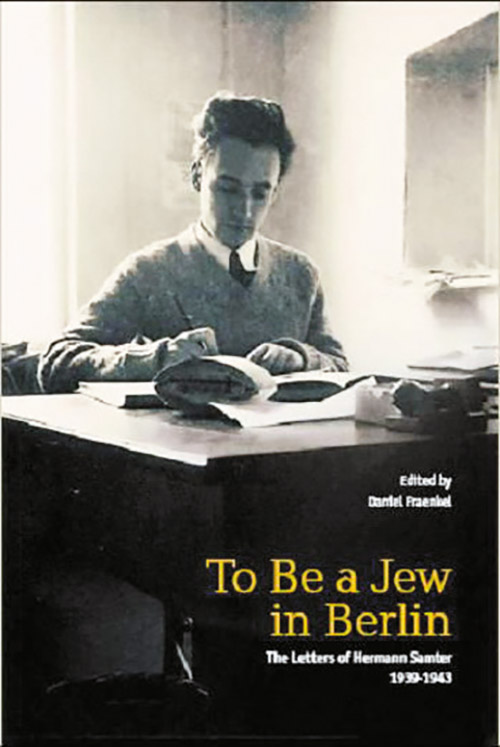
Highlighting: “To Be a Jew in Berlin, The Letters of Hermann Samter 1939-1943” by Daniel Fraenkel, Ed. Jerusalem, Yad Vashem: The International Institute for Holocaust Research, 2012. 128 pgs. ISBN: 978-965-308-412-4.
Hermann Samter was born on December 5, 1909, and was 33 at the time he, his wife Lili and aunt were deported to Auschwitz. Historian Daniel Fraenkel writes that the Samter family had been in Germany for several generations and were part of the educated class (Bildungsbürgertum), a “new elite of academics and freelance professionals, who since the time of the Enlightenment of the 18th century, cultivated the ideals of humanistic education, science, and literature.” Association with the Bildungsbürgertum enabled one to become part of German society and culture. Hermann’s father, Ernest, was a member of the radical Reform Congregation of Berlin, which represented an independent religious institution within the Jewish community. The Reform Congregation sought to divorce themselves from any outward manifestation of their Jewish affiliation that would differentiate them from other Germans. As Ernest noted in an article published in 1917: “We decline any national ties as Jews, because, nationality, we want to be only Germans.”
Das Jüdisches Nachrichtenblatt
Shortly before he was deported, Hermann Samter worked in the advertising department of the Das Jüdisches Nachrichtenblatt at 10 Meinekestraße, the only officially sanctioned German Jewish newspaper in Germany. The appointment ensured Samter a means to earn a living and excused him from being conscripted into forced labor. After November 1941, his position secured him and his aunt temporary reprieve from deportation. After Kristallnacht, the Germans banned all 65 Jewish newspapers in the country. The German propaganda ministry carefully monitored the Jüdisches Nachrichtenblatt, which published only content and articles about the Jewish community that they determined were fit to print.
The paper became a vehicle to inform the Jewish population regarding laws, decrees and directives relevant to them, since these edicts would not appear in the general German press. Recognizing the urgency to ensure compliance with the various bans and commands, the editors frequently added their own clarifications and explanations concerning the practical implications of these rulings. The advertising section, Fraenkel argued, played an “indispensable” role for the community, because the Jews were excluded from the German media and economy. Jews who suffered severe economic losses desperately needed a venue to sell their homes and other assets. Physicians and lawyers forbidden to practice and to have “Aryan” patients and clients could solicit the Jewish community; the unemployed could seek work; and relatives could post information for friends and families about births, deaths and emigration. As more Jews were deported, the Germans saw less need for the paper. By June 1943, it ceased publishing, with the advertisement section having been closed by December 1942.
The Letters
Samter lived in a room in his aunt’s house in the historical district of Berlin-Mitte, the home to more than 12,000 Jews, composing 4.88% of the citizens. In Berlin, Jews comprised 3.78% of the population. Frenkel notes Samter’s letters from September 12, 1940 to February 7, 1943 provide a “unique historical testimony” on contemporary Jewish life in Berlin during the deportations, as opposed to a retrospective record. They provide insight into the “the subjective point of view of Jewish victims.” For example, what was it like to survive on starvation rations; being confined to one’s home; having a strict curfew; forced to wear the yellow badge in public; separated from family who are out of the country; not being able to attend funerals of friends and family members, including those who committed suicide out of fear of being deported; or wonder when you might be the next to be expelled? In particular, did the Jews of Berlin have any idea of what the ultimate goal of the deportations might be? Fraenkel observes that though the letters do not afford the introspection found in the works of Victor Klemperer in Dresden or Chaim Kaplan in Warsaw, they offer a straightforward account of the last days of the Berlin Jewish community under Nazi rule.
Dr. Alex Grobman is the senior resident scholar at the John C. Danforth Society and a member of the Council of Scholars for Peace in the Middle East. He lives in Jerusalem.











